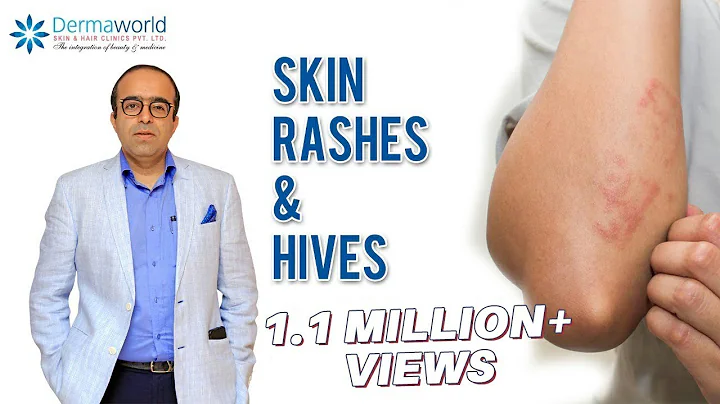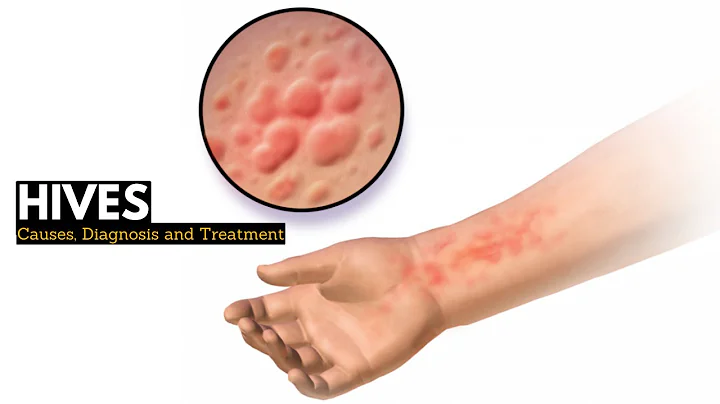Qianjiang Evening News·Hourly News Correspondent Chen Mengqian Reporter Zhang Bingqing
“As soon as night comes, I rub myself on the bed, and there are red wheals all over my body. It looks very scary.” In the Dermatology Department of Zhejiang University Children’s Hospital, the boy Dongdong’s My mother told the attending doctor Ren Yunqing.
Dongdong is 3 years old this year. A few days ago, for unknown reasons, red spots and wheals of different sizes appeared on her body at night, and she kept complaining of itching. After a while, the erythema and wheals will disappear on their own, and this situation will recur. Ren Yunqing looked at the photos taken by her mother and combined it with the condition description. After a specialist physical examination, she diagnosed it as acute urticaria .
Coincidentally, a month ago Ms. Li, who lives in Hangzhou, discovered that her 2-year-old baby also had a large area of red rash. It was midsummer at that time. Ms. Li thought it was prickly heat, so she applied some prickly heat powder to the baby. Not only did the red rash not heal, but it became more and more numerous. The rash on the calf gradually scabbed into patches, and even cracked and oozed pus. Then I took the child to the hospital, and after a specialist physical examination, he was diagnosed with eczema .
I also have skin allergies, redness, and itching. These red dots look similar. How can I tell whether they are urticaria or eczema?

Picture source: Visual China
For children, urticaria and eczema are two relatively common allergic skin diseases. The symptoms are very similar and are often confused by parents. Today, we invite Ren Yunqing, deputy director of the Dermatology Department of Zhejiang University Children's Hospital, to talk to parents about urticaria and eczema.
Urticaria
Speaking of urticaria, many people don’t know what it is, but when it comes to wheals and wheals, everyone is very familiar with it. The cause of urticaria is complex, the course of the disease is long, and it is easy to recur. Urticaria is defined as "a localized edema reaction due to the dilation and increased permeability of small blood vessels in the skin and mucous membranes." Clinically, it is characterized by sudden wheals. Chronic urticaria refers to wheals that occur at least twice a week and last for ≥ 6 weeks.
Features: It can occur at any age. It often starts with skin itching, and then wheals appear, which are bright red or pale, with different skin colors. The size and shape of the wheals vary, and the onset time is uncertain. The wheals gradually spread and can merge into sheets. The wheals last for several minutes to several hours and leave no trace after they subside. Severe acute urticaria may also be accompanied by systemic symptoms such as fever, nausea, vomiting, abdominal pain, diarrhea, chest tightness and throat obstruction.
Eczema
Eczema is one of the most commonly encountered diseases in dermatology. It is an inflammatory skin disease with obvious exudation tendency caused by a variety of internal and external factors. It is obviously itchy and easy to relapse, seriously affecting the patient's quality of life.
Features: The acute phase is characterized by erythema, edema, papules, blisters, erosion and exudation; the subacute phase is characterized by reduced redness, swelling and exudation, scabs and desquamation on the erosion surface; the chronic phase is characterized by rough and hypertrophic skin. Most of the rashes are symmetrically distributed, with severe itching and easy recurrence, seriously affecting the patient's quality of life.
How to distinguish
There are many differences between urticaria and eczema. We can distinguish them through the following points:
Cause: There are many causes of urticaria, and some patients have clear pathogenic factors, such as food, drugs, and infections; eczema There is usually no clear cause of the disease and it is caused by a combination of internal and external factors.
Duration: Most urticaria rashes can subside on their own within 24 hours without leaving any trace; eczema rashes usually last longer and are difficult to subside on their own within a short period of time.
Skin rash types: The skin lesions of urticaria are wheals, which are bright red or pale, skin-colored; the skin lesions of eczema include erythema, papules, papule herpes, erosion, exudation, etc.
Rash distribution: Urticaria rash distribution has no obvious regularity; eczema rashes are mostly symmetrically distributed.
Subconscious symptoms: Urticaria usually itches when the rash occurs, and the itching is reduced or disappears after the rash subsides; eczema usually itches significantly and lasts for a long time.
Complications: Severe urticaria can cause systemic symptoms such as nausea and vomiting, abdominal pain, diarrhea, chest tightness, dyspnea, and laryngeal edema; severe eczema can lead to secondary local bacterial and viral infections.
Treatment: External medication for urticaria is relatively simple, mainly oral antihistamines; for eczema, you need to choose different dosage forms of external medication according to different periods, and you must follow the doctor's advice.
Deputy Director Ren Yunqing reminded: If children have skin allergies, redness, itching, etc., they should go to the hospital for diagnosis and treatment as soon as possible. In particular, acute urticaria spreads all over the body. If you have chest tightness, abdominal pain, fever and other systemic symptoms, you should seek medical attention immediately. Chronic urticaria is often difficult to find the cause, and you need to take oral antihistamines as prescribed by your doctor for at least 1 month. For eczema, on the basis of strengthening moisturizing and moisturizing care, regular medication should be followed to reduce recurrence.
This article is an original work of Qianjiang Evening News. Without permission, any use of the copyright of the work, such as reprinting, copying, excerpting, adapting and disseminating on the Internet, is prohibited. Otherwise, this newspaper will pursue the legal liability of the infringer through judicial channels.





















